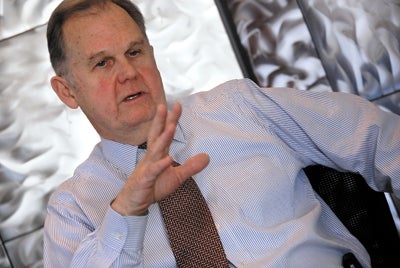In annual reports filed with the Securities and Exchange Commission, publicly traded companies must report risk factors. Normally these are fairly boilerplate disclosures that garner very little attention from investors or the financial press.
But a careful reader of annual reports from American Superconductor (AMSC), the Devens-based wind turbine parts manufacturer, may have discovered some clues about the headwinds the company is facing today, which include major staff cuts, a possible delisting from the Nasdaq as well as shareholder lawsuits.
Looking Back
So just how did American Superconductor — an innovative tech company at the forefront of the clean energy economy — end up in such a difficult position?
It was a confluence of factors, say investment analysts and accounting experts, and it’s still unclear if American Superconductor actually did anything wrong or was just the victim of bad luck.
American Superconductor hit hard times in April when it disclosed that one of its major Chinese customers, Sinovel Wind Group, had refused to accept AMSC parts that it had ordered.
The Chinese firm — which in the past three years has represented 70, 67 and 51 percent of AMSC’s total revenue — also refused to pay for other parts that had already been delivered.
Predictably, the collapse of an agreement with such a major customer has sent American Superconductor into a tailspin.
But in the end, the trouble was signaled in a one-sentence risk factor in the company’s annual report: “A significant portion of our revenues are derived from a single customer.”
The fallout of the crumbling Sinovel relationship has been swift. In April, investors filed class-action lawsuits against the company for not releasing more details about the situation.
The following month, the company’s founder and CEO, Gregory Yurek, retired.
The company has cut 30 percent of its workforce since March and has been warned that it may face delisting from the Nasdaq Stock Exchange for failing to file its most recent quarterly and annual reports.
While the company originally reported a $16-million profit on $114 million of revenues in the fourth quarter of last year, AMSC now says fourth-quarter revenues will be less than half of that.
Revenue Streams
American Superconductor’s major issue, according to investment analyst Carter Driscoll with Capstone Investments of New York, is that it had all of its eggs in one basket.
To the company’s credit, Driscoll said, AMSC realized before many companies that Asian markets would be a major boon for the wind turbine industry, especially compared to the American market.
“The problem was their customer concentration,” he said. “What Sinovel did was really slimy, but American Superconductor could have known better.”
During the past year, investment analysts have raised issues about the company’s diversification of revenues, he said.
It’s not healthy to have 70 percent of your revenues from a single customer, Driscoll noted.
But AMSC built up its revenues with Sinovel because the Chinese customer kept ordering product, said Jeremy Hellman, an analyst with Divine Capital Markets in New York.
“The diversification push wasn’t from a lack of winning business: It came from the fact that Sinovel kept ordering stuff,” he said.
Company officials were also on the way to remedying the situation through a planned acquisition of a Finnish company, The Switch Engineering Oy.
That $270-million deal would have helped diversify AMSC’s revenue, but since the trouble with Sinovel was announced, the acquisition has been delayed.
Lowered Expectations
The disagreement with Sinovel has caused AMSC to postpone filing its annual report. That’s because it now expects its revenues to be significantly lower than previously disclosed.
The company has said there could be more than $56 million worth of unpaid products that have been shipped out that have not been paid for.
The firm has reduced its full-year revenue guidance from more than $430 million to $307 million.
Despite the trouble that American Superconductor now faces, accounting experts say recording revenues before they are actually received is a fairly common and perfectly legitimate practice.
For a company to record revenue, there is a four-pronged test, according to William Tarzia, managing partner at CCR LLP’s Westborough office.
There must be persuasive evidence of an order being placed; the price of the product must be fixed and identified; the product must be delivered; and collectability must be reasonably assured. If a company can prove those four factors, then it can record money as revenue even if it hasn’t yet received the payment.
Jeffrey Swanberg, a partner at Worcester-based CPA firm Bollus Lynch, agreed.
If a company can prove to a reasonable extent the above factors “then it becomes a matter of accounts receivable and collectability,” he noted.
The alternative accounting method is using a cash-based system where revenues are only recorded when payments are received. That’s how AMSC said it will be operating from now on.
So what can be done now?
The first order of business, Driscoll with Capstone Investments said, is for AMSC to figure out exactly what happened, how much revenue it can collect from Sinovel and what, if any, recourse the company will take against Sinovel.
But AMSC must tread carefully.
The situation is complicated because of the international nature of the dispute, said David Woronov, head of international practices for the Boston-based law firm of Posternak, Blankstein & Lund.
If an international client does not have operations in America, Woronov said, litigation usually has to be filed in the accused company’s home country, meaning AMSC would have to bring legal action against Sinovel — if it chooses to do so — in China. AMSC has made no mention of potential legal action.
Woronov said the AMSC example is a good lesson for other businesses, which should be careful when doing business internationally because of the difficulty in settling such matters.
“What’s really important is to understand what is enforceable in China,” he said.

